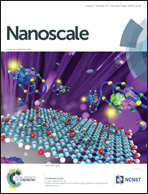Dextran-coated superparamagnetic nanoparticles as potential cancer drug carriers in vivo
Abstract
Dextran-coated superparamagnetic iron oxide nanoparticles (DSPIONs) have gained considerable interest, because of their biocompatibility and biosafety in clinics. Doxorubicin (Dox), a widely used chemotherapeutic drug, always has limited applications in clinical therapy due to its serious side effects of dose-limiting irreversible cardiotoxicity and myelo suppression. Herein, DSPIONs were synthesized and developed as magnetic carriers for doxorubicin. The Dox–DSPION conjugates were evaluated in the in vitro test of Dox release, which showed pH-dependence with the highest release percentage of 50.3% at pH 5.0 and the lowest release percentage of 11.8% in a physiological environment. The cytotoxicity of DSPIONs and Dox–DSPIONs evaluated by the MTT assay indicated that DSPIONs had no cytotoxicity and the conjugates had significantly reduced the toxicity (IC50 = 1.36 μg mL−1) compared to free Dox (IC50 = 0.533 μg mL−1). Furthermore, confocal microscopic data of cell uptake suggest that less cytotoxicity of Dox–DSPIONs may be attributed to the cellular internalization of the conjugates and sustainable release of Dox from the formulation in the cytoplasm. More importantly, the results from the rabbit VX2 liver tumor model test under an external magnetic field showed that the conjugates had approximately twice the anti-tumor activity and two and a half times the animal survival rate, respectively, compared to free Dox. Collectively, our data have demonstrated that Dox–DSPIONs have less toxicity with better antitumor effectiveness in in vitro and in vivo applications, suggesting that the conjugates have potential to be developed into chemo-therapeutic formulations.


 Please wait while we load your content...
Please wait while we load your content...